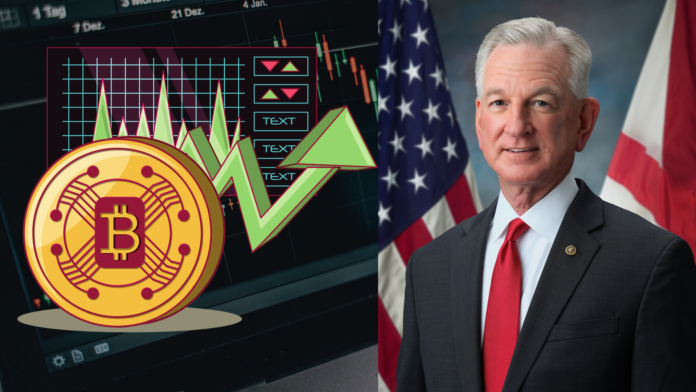Bill to Allow Retirement Fund Investment into Crypto to be Introduced in US
US Senator Tommy Tuberville has introduced a bill aimed at preserving the right of retiring Americans to invest their 401(k) funds as they choose, including in cryptocurrencies.
Bitcoin Price Surge Following Announcement
Following the announcement of the bill, Bitcoin experienced a notable price increase. As of today, Bitcoin is trading at $83,089.37, reflecting a 1.16% gain in the past 24 hours. The surge indicates heightened investor confidence, with trading volume soaring 55.42% to $27.19 billion. Market analysts suggest that the bill’s potential approval could lead to further institutional adoption, pushing cryptocurrency prices even higher.
As the debate around cryptocurrency investments in retirement funds continues, the Financial Freedom Act of 2022 could play a significant role in shaping the future of self-directed 401(k) investment choices in the US.
JUST IN: ?? Senator Tommy Tuberville to introduce bill allowing Americans to invest their retirement funds in #Bitcoin and crypto. pic.twitter.com/SqQRiw0p3m
— Bitcoin Magazine (@BitcoinMagazine) March 31, 2025
A Move to Protect Financial Freedom
Senator Tommy Tuberville recently presented a new bill in the US Parliament that could act as a barrier to government attempts to limit investments in Bitcoin (BTC) and other cryptocurrencies under the 401(k) retirement plan. If passed, the bill would ensure that retirees retain the freedom to invest their 401(k) savings in digital assets without government restrictions.
The proposed legislation, named the Financial Freedom Act of 2022, seeks to counter the Department of Labour’s (DOL) recent attempts to restrict cryptocurrencies as an investment choice for 401(k) self-directed retirement plans. The bill would also safeguard financial institutions and employers from potential legal consequences if they offer cryptocurrency investment options under 401(k) plans.
Opposition to Department of Labour’s Guidance
A press release from Senator Tuberville’s office criticized the DOL’s actions, stating: “The [DOL’s] guidance attempts to bar 401(k) investors from investing in cryptocurrency and undermines the ability of 401(k) plans to offer brokerage windows, which give retirement plan participants the ability to personally control how their assets are invested.”
In March, the DOL issued a warning to financial service firms that expose their 401(k) participants to digital assets. Citing concerns such as volatility, uncertain valuations, and an evolving regulatory landscape, the DOL implied that employers and financial institutions facilitating crypto investments could be subjected to investigations and enforcement actions.
A House Companion Bill for the Financial Freedom Act
The Financial Freedom Act of 2022 aims to empower retirement savers and protect financial firms from punitive measures for allowing investors to exercise financial autonomy.
Florida Representative Byron Donalds, another US Congressman, introduced a companion bill in the House of Representatives, reinforcing the objective of the Financial Freedom Act. While presenting the House version, Donalds remarked, “Today, I introduced the House companion of the Financial Freedom Act of 2022. This bill prohibits [the DOL] from restricting the type of investments that self-directed 401(k) account investors can choose.”
Implications for the Market
The introduction of this bill could have significant implications for both the cryptocurrency market and traditional investment structures:
- Increased Crypto Adoption: If passed, the bill could lead to a surge in institutional and retail investments in cryptocurrencies, boosting market growth.
- Regulatory Uncertainty: While it supports financial freedom, it may also lead to increased scrutiny and regulatory changes in the retirement investment sector.
- Volatility Risks: As more retirement funds enter the crypto space, market volatility could impact retirement portfolios, making risk management essential.
- Financial Firm Adaptation: Investment firms may need to revise their strategies to accommodate digital asset offerings in 401(k) plans.
Disclaimer: Crypto products and NFTs are unregulated and can be highly risky. There may be no regulatory recourse for any loss from such transactions.




